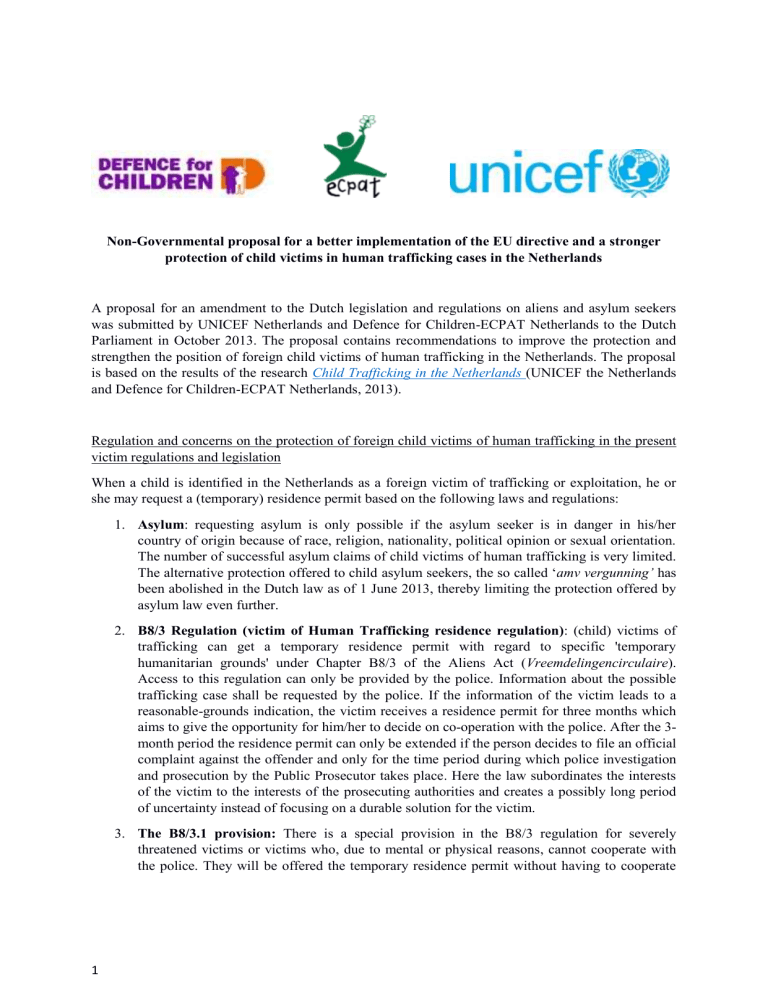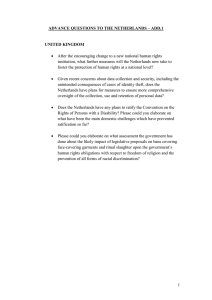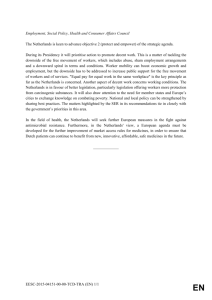Non-Governmental proposal for a better implementation of the EU directive... protection of child victims in human trafficking cases in the...

Non-Governmental proposal for a better implementation of the EU directive and a stronger protection of child victims in human trafficking cases in the Netherlands
A proposal for an amendment to the Dutch legislation and regulations on aliens and asylum seekers was submitted by UNICEF Netherlands and Defence for Children-ECPAT Netherlands to the Dutch
Parliament in October 2013. The proposal contains recommendations to improve the protection and strengthen the position of foreign child victims of human trafficking in the Netherlands. The proposal is based on the results of the research Child Trafficking in the Netherlands (UNICEF the Netherlands and Defence for Children-ECPAT Netherlands, 2013).
Regulation and concerns on the protection of foreign child victims of human trafficking in the present victim regulations and legislation
When a child is identified in the Netherlands as a foreign victim of trafficking or exploitation, he or she may request a (temporary) residence permit based on the following laws and regulations:
1.
Asylum : requesting asylum is only possible if the asylum seeker is in danger in his/her country of origin because of race, religion, nationality, political opinion or sexual orientation.
The number of successful asylum claims of child victims of human trafficking is very limited.
The alternative protection offered to child asylum seekers, the so called ‘ amv vergunning’
has been abolished in the Dutch law as of 1 June 2013, thereby limiting the protection offered by asylum law even further.
2.
B8/3 Regulation (victim of Human Trafficking residence regulation) : (child) victims of trafficking can get a temporary residence permit with regard to specific 'temporary humanitarian grounds' under Chapter B8/3 of the Aliens Act ( Vreemdelingencirculaire ).
Access to this regulation can only be provided by the police. Information about the possible trafficking case shall be requested by the police. If the information of the victim leads to a reasonable-grounds indication, the victim receives a residence permit for three months which aims to give the opportunity for him/her to decide on co-operation with the police. After the 3month period the residence permit can only be extended if the person decides to file an official complaint against the offender and only for the time period during which police investigation and prosecution by the Public Prosecutor takes place. Here the law subordinates the interests of the victim to the interests of the prosecuting authorities and creates a possibly long period of uncertainty instead of focusing on a durable solution for the victim.
3.
The B8/3.1 provision: There is a special provision in the B8/3 regulation for severely threatened victims or victims who, due to mental or physical reasons, cannot cooperate with the police. They will be offered the temporary residence permit without having to cooperate
1
with the police or the Public Prosecutor. This particular procedure is quite unknown and there is no indication of how many children have used this particular procedure.
1
Defence for Children-ECPAT Netherlands and UNICEF The Netherlands find none of the above mentioned possibilities particularly suitable for most of the child victims of human trafficking since it does not provide a durable solution. UNICEF the Netherlands and Defence for Children-ECPAT
Netherlands discussed an amendment of B8/3 regulation with parliamentarians. The proposed changes would implement human rights requirements and the directive 2011/36/EU (hereafter EU Trafficking
Directive) in the Dutch regulation.
Proposal on the improvement of the current regulation
With regard to the above discrepancies in protection of child victims of trafficking UNICEF the
Netherlands and Defence for Children-ECPAT Netherlands propose the following alterations of the law and regulations:
1.
The right of residence should not depend on the will of the victim to file a report with the police. Protection of minor victims taking their age and youth in account, should be a central element of the victims regulation and not their willingness to cooperate with the police and for the duration of the police investigation . This will ensure the implementation of article 13 of the EU Trafficking Directive.
UNICEF the Netherlands and Defence for Children-ECPAT Netherlands propose to include the group of foreign minors who are identified as a victim of trafficking, in the B8/3.1 regulation. They should be eligible for a residence permit based on humanitarian reasons without the requirement of filing a complaint. It should still be possible for all minors to file a complaint when they wish to do so and if it is in their best interest.
2. Guardians and child victims of trafficking will make a plan of action working towards a durable solution within an acceptable term, based on a best interest of the child determination and taking into consideration the opinion of the child. This proposal implements article 14 and 16 of the EU Trafficking directive and article 3 UNCRC. It also echoes consideration 23 of the preambule of the EU Trafficking Directive.
In developing the plan of action the responsible authority shall take into consideration the following aspects: 1) the opportunity for reunion with the parent(s), 2) the best place for the child to be residing considering the best interest, 3) the desirability to work on immediate repatriation, 4) the possible medical or psychological support which should be offered to the child, 5) the education to be followed by the minor.
The leading principles in the plan of action should be the continuity and safety of the foreign child victim. Therefore, the authorities working with the minor should be working on a durable solution for the child within an 'acceptable term'. The acceptable term strongly depends on the age and the development of the child: it is usually shorter for small children than for older children. However it should not be longer than one year. The term of one year during which a durable solution should be found is in line with a number of norms in national and international family law, for instance the term for determining the place of regular residence according to international private law or the request for legal guardianship by foster parents in Dutch family law.
1 Letter of the Ministry of Security and Justice to Defence for Children-ECPAT Netherlands of 25 March 2014.
2
In case of return to the country of origin or a third country, guardians appointed by Dutch authorities are advised to use a checklist of personal and environmental circumstances for the determination of the best interest of the child. It is advised to consider Standard 6 of the Core standards for guardians of separated children in Europe ( Core standards for guardians of separated children in Europe. Goals for guardians and authorities . Defence for Children e.a.2011., p. 29 ev.
).
UNICEF the Netherlands and Defence for Children-ECPAT Netherlands believe that the above changes will improve the current regulations concerning the care and support for foreign child victims, fulfil human rights' requirements and help the effective (re)integration of child victims of exploitation and human trafficking either in the Netherlands or in their country of origin.
Contact:
Defence for Children-ECPAT Netherlands, Laura Bosch, l.bosch@ecpat.nl
Martine Goeman, m.goeman@defenceforchildren.nl
+ 31 71 5160980
UNICEF Netherlands, Majorie Kaandorp, mkaandorp@unicef.nl
+ 31 70 3339328
3



